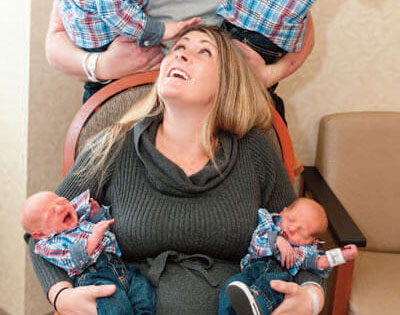“We love our new life with our four boys - we’re so happy, I can’t say enough good things about my doctors and the entire staff – they were amazing. The nurses were phenomenal. They were caring and supportive and helped keep me calm,” says Kaitlyn.

Imagine giving birth to one set of twin boys. Then, imagine giving birth to a second set of twin boys less than three years later. Kaitlyn and Jason Prior did just that.
The Bayville couple doubled the number of their children – from two to four – on February 11 when they welcomed their second set of twins Colton and Dallas. The first set of twins – Aiden and Brayden – were born in 2013. Twins are part of Kaitlyn and Jason’s DNA; they have nine sets of twins in their extended families. Both sets of the Prior twins were conceived naturally.
Studies show that the chance of having a second set without fertility is about 1-in-3,000. Despite the family history, Kaitlyn didn’t think she would have twins again, but her husband did.
When Kaitlyn first learned this was the case, she had a million thoughts racing through her head. “At first, I was overwhelmed and I wondered how I was going to be a mom to four kids under 3-years-old especially since I planned on returning to work as a special education teacher. But then, I realized that you’re only given what you can handle and I knew it would all work out.”
Prior to her recent delivery, Kaitlyn was in pre-term labor five times and eventually delivered Colton and Dallas via C-section at 38-weeks. Coincidentally, both sets of twins were delivered by the same doctor and labor and delivery nurse at Community Medical Center.
Amadi Rezai, M.D., a board-certified OB/GYN with Barnabas Health Medical Group, who delivered both sets of twins, has been practicing obstetrics for 16 years and says Kaitlyn is his only patient who has had two pregnancies and four babies. “Twins are more common with IVF and ART, but Kaitlyn's babies were conceived naturally,” says Dr. Rezai.
“The interesting part is that if these twins are identical, then the incidence is one in tens of thousands but if the new twins are fraternal, then the incidence is one in roughly 3,000. Because these twins had their own placentas and amniotic sacs and are the same gender, the only way to tell is through genetic testing.”
“I can’t say enough good things about my doctors and the entire staff – they were amazing. The nurses were phenomenal. They were caring and supportive and helped keep me calm,” says Kaitlyn.
“I would absolutely recommend Community Medical Center to any expectant mom.” While things are super busy at the Prior household, Kaitlyn is grateful for the hands-on help she gets from her mother and mother-in-law who live nearby.
Aiden, Brayden and “Diesel,” – a 6-pound teacup Yorkie - are adjusting well to the changes in the household and really like their new brothers. “When we first got home, it was a lot to take in,” admits Kaitlyn. “We love our new life with our four boys - we’re so happy.”